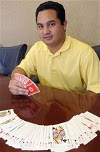Conditions of Contest Need to Be Adhered To
By and large, the ACBL and USBF do a great job running tournaments. The events are completed in a fair and timely manner 99% of the time. Reading Judy’s blogs the last couple of weeks about the complaints about a the way an event was run in Las Vegas recently reminded me of the one and only time I have had a major gripe about the way an event was run. This was in May 2009, before I started blogging, in the trials to send 2 teams to a junior world championship in Istanbul. It was to be a 3 session matchpoint trial on Bridge Base. This was only the second time I even tried our for a junior team partly because I hadn’t a regular junior partner but mostly because it always interfered with school or work or just wasn’t somewhere that I cared to go to but Istanbul is somewhere I really do want to go to and I like playing with Bryan.
I arrived at the airport in Manila at 11pm after a 14 hour flight from Atlanta to Tokyo and a 4.5 hour flight from Tokyo to Manila. (Fortunately the flight I had purchased before the time for the trials was announced just did allow me to still participate) The first session was to start at 1am local time with the second session at 6am (1pm and 6pm Eastern Daylight time). So I got an ample supply of Mountain Dew and snacks and got to the hotel and got online just in time to play with Bryan Delfs. After the first two sessions, we were right around average – 10th out of 18 pairs, I think. 12 pairs made the cut to the third session with the top 6 after that making up the 2 USA teams. Needless to say, the final session Sunday would need to be a good one, but according to common sense and the conditions of contest, there would be carryover in accordance with the ACBL formula. So, theoretically, our 4 board deficit behind 1st place would be reduced to about 2 boards but we were never told anything about how much the carryover actually would be. The conditions of contest also stated that the final session would be a round robin or a howell movement to allow us to play as many of the other pairs as possible. I can’t find a final conditions of contest now but the draft conditions of contest are still available on the USBF website.
I slept from about 9am to noon, went out around Manila all day and got back in time for the 1am start to the final session. What happened with the final session was very disconcerting to me. They ran the event as SWISS PAIRS WITH PLAYBACKS – not a round robin or Howell. Making it even worse, the Swiss pairings were based on NO CARRYOVER from the first day. Not only does this not follow the conditions of contest but it’s just a bad movement. We were leading the field most of the session so kept having to face other pairs who were doing well even though overall we were nowhere near first. We had one playback and that was having to face Justin Lall and Jeremy Fournier, clearly the top pair in the event, each of the last two rounds. Making things even worse, the final event standings had FULL CARRYOVER from the first day and they didn’t even tell us that they were doing this before hand. Had they fixed any of the three gross errors (allowing playbacks, swiss pairings without carryover, or applying carryover formula after the cut), we surely would have gotten into 6th place. As it stood we were less than a point out of 6th, which went to Cam Shunta and Adam Kaplan.
When I questioned the USBF coordinator, all they said was that they changed their minds about the carryover and that the BBO software wouldn’t allow them to run a Howell movement, and I didn’t push the issue any further. The final results of the event are here.



As someone who has written CoC for the Scottish national trials, I can tell you that it is a thankless task. This is especially true for a new event where you have little idea about the number of entries and the standard may be diverse (you may think I am discussing the USBF Junior Trials but the Scottish Open are not so different in this respect).
In my experience the selectors are trying to do a good job but the CoCs are deficient in such circumstances and do not cover every eventuality. Sometimes it becomes apparent that they are not actually fit for purpose, despite being available beforehand for everyone to scrutinise. It is likely that the selectors, or co-ordinators, have to make adjustments.
It is unfortunate when this happens but I think you need to cut them some slack for a new competition.